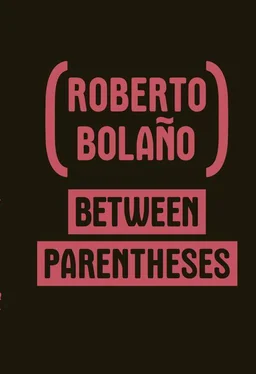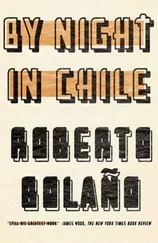Roberto Bolaño - Between Parentheses - Essays, Articles and Speeches, 1998-2003
Здесь есть возможность читать онлайн «Roberto Bolaño - Between Parentheses - Essays, Articles and Speeches, 1998-2003» весь текст электронной книги совершенно бесплатно (целиком полную версию без сокращений). В некоторых случаях можно слушать аудио, скачать через торрент в формате fb2 и присутствует краткое содержание. Год выпуска: 2011, Издательство: New Directions, Жанр: Публицистика, Критика, на английском языке. Описание произведения, (предисловие) а так же отзывы посетителей доступны на портале библиотеки ЛибКат.
- Название:Between Parentheses: Essays, Articles and Speeches, 1998-2003
- Автор:
- Издательство:New Directions
- Жанр:
- Год:2011
- ISBN:нет данных
- Рейтинг книги:4 / 5. Голосов: 1
-
Избранное:Добавить в избранное
- Отзывы:
-
Ваша оценка:
- 80
- 1
- 2
- 3
- 4
- 5
Between Parentheses: Essays, Articles and Speeches, 1998-2003: краткое содержание, описание и аннотация
Предлагаем к чтению аннотацию, описание, краткое содержание или предисловие (зависит от того, что написал сам автор книги «Between Parentheses: Essays, Articles and Speeches, 1998-2003»). Если вы не нашли необходимую информацию о книге — напишите в комментариях, мы постараемся отыскать её.
The Savage Detectives
Between Parenthese
Between Parentheses: Essays, Articles and Speeches, 1998-2003 — читать онлайн бесплатно полную книгу (весь текст) целиком
Ниже представлен текст книги, разбитый по страницам. Система сохранения места последней прочитанной страницы, позволяет с удобством читать онлайн бесплатно книгу «Between Parentheses: Essays, Articles and Speeches, 1998-2003», без необходимости каждый раз заново искать на чём Вы остановились. Поставьте закладку, и сможете в любой момент перейти на страницу, на которой закончили чтение.
Интервал:
Закладка:
Vienna and the Shadow of a Woman
I don’t know what was best about Vienna: whether it was Vienna or Carmen Boullosa. Everyone knows that Vienna is a beautiful, cultured city, the capital of a country that flirts (and its flirting may have reached the feeling-up stage) with neo-fascism. But few in Spain know who Carmen Boullosa is.
The first reports I had of her told of a very beautiful woman who was causing the Mexican lyrical poets to lose their heads. Carmen, who at the time hadn’t yet begun to write novels, was also a Mexican lyrical poet. I didn’t know what to think. All those poets head-over-heels in love with a poet struck me as excessive. On top of it all, the poets who had been dumped by Carmen (or by themselves) got to be friends, or were already friends, and had formed a de facto group or club that met once a week or once a month at bars in the center of Mexico City or in Coyoacán to revile their former beloved.
I also learned, always from third parties, that in response Carmen had started a club or society or commando group of women writers who met in secret, just like their male counterparts.
One day, in a book about contemporary Mexican literature, I saw a picture of her. She was definitely a beautiful woman, dark, tall, with huge eyes and hair down to her waist. I thought she was very attractive, but I also imagined that she must write like one of the many imitators of a magic realism made for the consumption of zombies.
Then I read something she had written and my opinion changed: Boullosa had nothing to do with imitators or imitators of imitators. I read just a few pages, but I liked what I read. And then I received an invitation to come to Vienna, where we would both give readings.
One of the good things about going to Vienna is that you can fly Lauda Air, the airline founded by the mythic Formula 1 driver, with stewardesses who dress like racetrack mechanics. The food is good, too. If you’re lucky (or unlucky) the plane may even be flown by Nikki Lauda himself. And a little while later, in the time it takes to pray three Our Fathers, you’re sitting in a taxi in Vienna, and if you’re lucky you might even be staying at the Hotel Graban, a little place on the Dorotheergasse, next to St. Stephen’s Cathedral, or in other words right in the center of the city. Though the most important thing about the Hotel Graben isn’t its location, but the fact that it’s the place where Max Brod and Franz Kafka stayed when they came to Vienna.
Outside of the hotel there’s a huge bronze plaque that says this, but I arrived at night and didn’t see the plaque, so when the receptionist told me that she was going to give me Brod’s room or Kafka’s room (I wasn’t sure which), I thought she was recommending that I read both Prague writers, which, given the country’s political situation, seemed very timely. Then, gathering my courage, I asked whether she had any information about the arrival of Frau or Fraulein Boullosa, which the receptionist pronounced Bolosa, and which made me think that even though Carmen was Mexican and I was Chilean, we shared the same Galician roots. Her answer disappointed me deeply. Not only was Frau Bolosa not at the hotel, she didn’t have a reservation, and nothing was known about her.
So I went for a walk nearby, along Graben (curious: my hotel was called Graben but it wasn’t on Graben), through the cathedral square, past the Stephansdom, the Figarohaus, the Franziskanerkirche, the Shubertring and the Stadtpark, the places that my friend Mario Santiago had roamed by night, stealthily, and then I returned to the hotel and went to bed and spent a strange night, as if there really were someone else in my room, Kafka or Brod or one of the thousands of guests who’ve stayed at the Graben and are now dead.
In the morning I met Leopold Federmair, a young Austrian novelist, and together we walked around the city some more, visiting the cafés that Bernhard had frequented when he was in Vienna, one place that was very close to my hotel, on the Lobkowitzplatz or the Augustinerstrasse, I can’t remember which, and then the Café Hawelka, across from my hotel, where the owner, a little old woman out of a medieval folktale, offered us free buns for which she later charged us, and then we walked some more and visited other cafés, until it was time for my reading, and time for me to meet or to not meet Carmen Boullosa, who was nowhere to be found.
When we got to the hall — late, because Federmair got lost twice — she was already there. I recognized her easily, though in person she’s even prettier than in pictures. She seemed shy. Smart and nice. After a party at a restaurant with a Turkish cannonball still embedded in the wall, palpable proof of the Viennese sense of humor, which is somewhere between naïve and twisted, we were left alone. Then she told me that St. Stephen’s Cathedral was secretly consecrated to the devil and then she told me all about her life. We talked about Juan Pascoe, who was her first editor in Mexico, and also mine; about Verónica Volkow, Trotsky’s great-granddaughter; about Mario Santiago, who had been to her house a few times; about our respective children.
After leaving her at her hotel I walked back to the Graben and that night I was visited or dreamed that I was visited by Kafka, or Brod, and I saw both of them, one in my room and the other in the room next door, packing or unpacking suitcases and whistling a catchy tune that the next morning I was whistling too.
Our next excursion was to the Danube, which we reached by metro. Boullosa was even more beautiful than the night before. We set out walking toward Hungary and along the way we saw a couple of skaters, a woman sitting and watching the river, a woman who stood and cried without making a sound, and some very strange ducks, some black and others light brown, and each black duck was paired with a light brown one, which led Boullosa to muse that opposites attract, unless the black ducks were parents and the light brown ones babies.
And then everything went as well as it could have gone. Kafka and Brod abandoned the hotel; Helmut Niederle, a wonderful Viennese man, told me the story of the famous shoemaker of Vienna, which I included in a book; we had dinner at the Mexican embassy, where the ambassador (at Boullosa’s urging, I imagine) kindly treated me as if I were Mexican; I insulted a Nazi without meaning to; I didn’t dare set foot in St. Stephen’s Cathedral; I met Labarca, an excellent Chilean novelist, and two Latin American girls who organize an annual beatnik festival in Vienna; and most of all I walked and talked endlessly with Carmen Boullosa, the best woman writer in Mexico.
The Last Place on the Map
Ushuaia, the southernmost city in the world, located on the north edge of the Beagle Channel and at the foot of the Martial Mountains, is the dazzling, natural, and untamed heart of the province of Tierra del Fuego.
For a long time, first in the South American imagination and then in Europe and America, in part due to the books by certain meticulous travelers, and most especially English travelers, and most especially Chatwin, Patagonia was something like what the vast and restless territory of the U.S.-Mexican border has been and continues to be. Instead of desert, pampa; instead of sleepy sun-baked towns, farmhouses swept by the wind and southern rain; instead of crowds of strange people singing strange songs, just a few scattered inhabitants and almost uninterrupted silence. And yet both the Mexican border region and the provinces that make up the territory of Patagonia constituted, along with the jungle, the fabled last place, the sacred place of the individual, the space where one goes to die or to watch the time pass, which amounts to essentially the same thing. The jungle, perhaps because of its profusion of mosquitos and the inevitable illnesses they carry, has gone out of fashion: travelers, even terminally ill travelers, want to die in peace, that is cradled and lulled by a specific aesthetic that excludes, one can safely say, dengue fever, irksome insect bites, and even more irksome diarrhea. The Mexican border region and Patagonia, in this sense, have much to offer: tequila, cocaine, and women to the north; maté, good barbecue, and temperatures worthy of any scholastic philosopher in the far south. One travels to Patagonia but one also flees to Patagonia. The literature chronicling this kind of flight isn’t only Anglo-Saxon. At the end of Ernesto Sábato’s On Heroes and Tombs , when all the protagonist’s dreams have been dashed and he seems doomed, he decides to get on a bus and set off for the south. Other writers have followed Sábato’s example.
Читать дальшеИнтервал:
Закладка:
Похожие книги на «Between Parentheses: Essays, Articles and Speeches, 1998-2003»
Представляем Вашему вниманию похожие книги на «Between Parentheses: Essays, Articles and Speeches, 1998-2003» списком для выбора. Мы отобрали схожую по названию и смыслу литературу в надежде предоставить читателям больше вариантов отыскать новые, интересные, ещё непрочитанные произведения.
Обсуждение, отзывы о книге «Between Parentheses: Essays, Articles and Speeches, 1998-2003» и просто собственные мнения читателей. Оставьте ваши комментарии, напишите, что Вы думаете о произведении, его смысле или главных героях. Укажите что конкретно понравилось, а что нет, и почему Вы так считаете.












